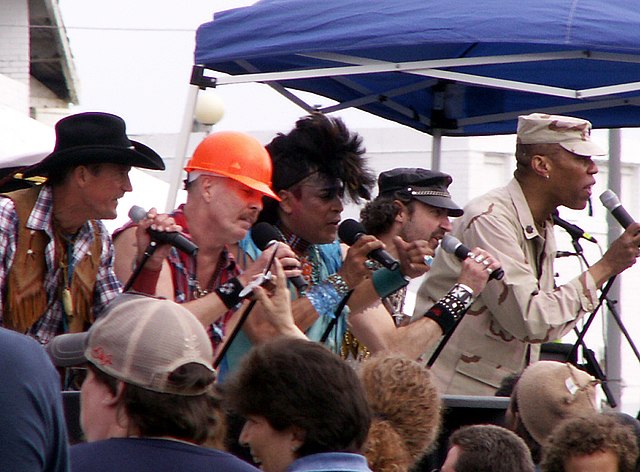The Village People were absolutely not any kind of gay community project. Many of them weren’t gay, and this was a commercial venture—in the early 70s there existed a post-Stonewall gay market, largely male, who danced to disco in new commercial clubs and liked hearing songs that alluded to, if in a roundabout way, queer life. And so, the band produced an album called Cruisin’—gay slang for seeking casual sex in public places—which included their biggest hit, “YMCA”, a reference the famous sexual shenanigans at the titular chain of institutions in New York. George Chauncey’s classic history Gay New York refers, for example, to a “free for all” and “never ending sex” in the showers (this perhaps isn’t widely understood—a few years ago, visiting Stockport, where I grew up, I chanced on the local Pride parade where the Scouts marched past to the tune of “YMCA”).
Other tracks included “Macho Man”, at a time when a look featuring 501s and moustaches was huge in gay venues. The original recruiting advert for group members specified “Macho Types Wanted: Must Dance And Have A Moustache.” “Go West” referred to San Francisco as a “gay El Dorado”. The journey from New York to the west coast was undertaken by Harvey Milk among others, and the golden memory of pre-AIDS San Francisco is depicted in Armistead Maupin’s Tales of the City books. The repeated “Together!” of the lyrics references, I think, both personal relationships and a new-found sense of community—amid the nod-and-wink references and exploitation of the audience, there are moving bits of social history in the mix. “In the Navy” plays on tropes about horny sailors and on-board sex, with puns about seamen/semen and recruitment to “openings in the navy”.
All of this is tacky, sure. But gay male culture in the 70s, outside of New York and San Francisco, was cobbled together out of all kinds of tacky things. In 70s Britain, John Inman and Larry Grayson were on television. Gay bars were decorated (New Union in Manchester, I’m looking at you) with flock wallpaper and little reproductions of Michelangelo’s David. Disco tracks featured black divas singing of men they had lost (such as Phyllis Nelson’s “Don’t Stop the Train” in clubs where no actual black women were ever present. You can’t invent a subculture overnight, and all this allowed room for retreat and disavowal should it become necessary—it’s a statue by a respected artist, it’s a song about heterosexual love, the Village People are only joking.
The thought that the Village People were only joking, or a straight unwillingness to acknowledge what they were actually referring to ( for example, that a disco song could mention anal sex, even via a double entendre) led to confusion back in the day, as when the US Navy considered using “In the Navy” in recruitment adverts. And the space left open for ambiguity comes into play again now that Victor Willis, the last remaining member of the original group, is performing as part of the Trump inauguration and trying to disentangle “YMCA” from its status as (come at me, Willis’s lawyers!) a gay anthem. A wide streak of opportunism and an eye on the money were always big parts of Village People’s take on queer folk. During the election campaign, presumably thinking of their fanbase, they tried to stop Trump using “Macho Man”. But now that he’s won, “YMCA” is to be, well, straightwashed if that’s where there’s money to be made. The ambiguities of gay male enthusiasm for macho aesthetics return to haunt us as a celebration of hairy-chested hotness is used to praise Donald Trump. Fifty years on, you might think, we have unambiguous queer voices like Lil Nas X and Chappell Roan. But then you hear a censored version of “Call Me By Your Name” playing in Tesco, and questions about representation arise all over again.
